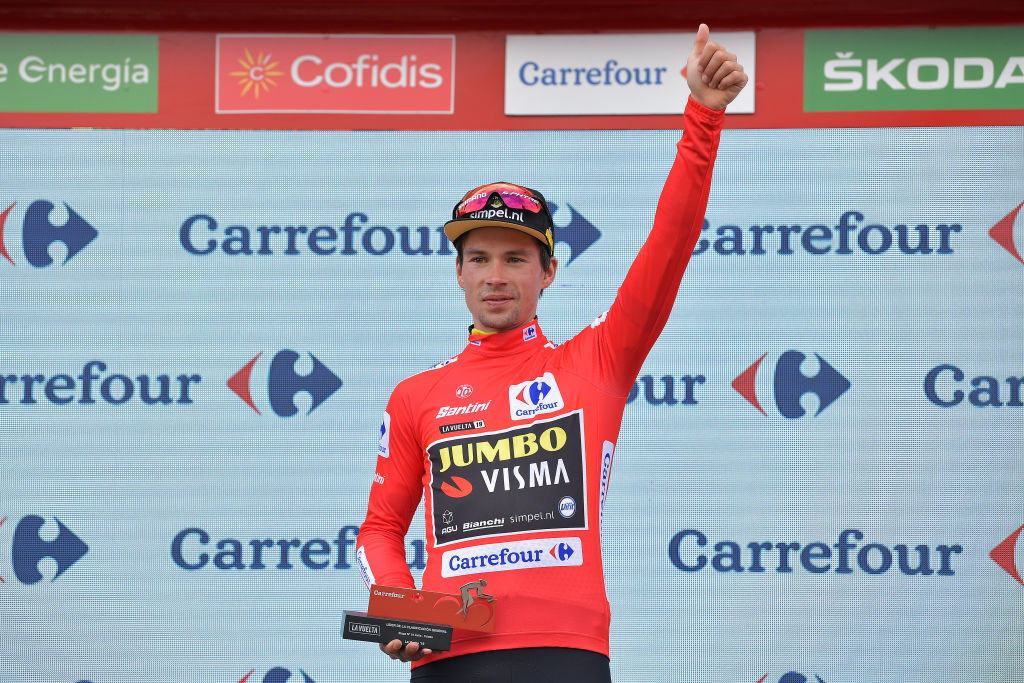Roglic faces final Vuelta a España showdown in Sierra de Gredos
Last mountain stage of the Vuelta returns to scene of epic 1983 battle

The 2019 Vuelta a España tackles its last mountain stage on Saturday in the Sierra de Gredos, west of Madrid, in what will be both Primož Roglič’s last challenge en route to an increasingly likely overall victory, and also a return to the scene of one of the most important climbing and GC battles in the Vuelta’s own history.
Back in 1983, Gredos was where Bernard Hinault managed to turn the Vuelta overall classification on its head, attacking first on the Peña Negra climb – the last first category of the 2019 race on Saturday – then again on El Pico, and finally dropping overnight leader Julian Gorospe of Spain on the Seranillos – the second ascent of Saturday’s stage.
Gorospe finally finished 20 minutes down in Ávila, where Hinault had managed to beat two more top Spaniards, Marino Lejaretta and Vicente Belda, in a three-way sprint and won the Vuelta into the bargain.
It was, he later said, his hardest ever Grand Tour win of the ten he took, and his knee was so wrecked by tendinitis after the 1983 Vuelta he opted not to do the Tour de France.
That day in 1983 was a legendary day of racing in its own right, but Gredos ‘83 is also remembered as the key stage in a Vuelta which – thanks to the epic battle between Hinault, a four-time Tour winner, and a host of young Spanish challengers – enabled cycling’s third Grand Tour to regain international interest and credibility.
That was particularly important following a turbulent 1982 edition in which local start Angel Arroyo was stripped of the victory following a positive doping test.
Gredos, then, has a legendary past in the Vuelta’s history, but what does it represent 36 years on in the 2019 edition? With 4,430 vertical metres of climbing over 190 kilometres running from Arenas de San Pedro to the Plataforma de Gredos, what is unusual is that rather than saving its main difficulties for the end – which is a long, but straightforward, third category ascent – the stage’s toughness lies in its global difficulty.
Get The Leadout Newsletter
The latest race content, interviews, features, reviews and expert buying guides, direct to your inbox!
The biggest challenge of stage 20, in fact, is that there’s barely a metre of flat all day.
No sooner do the 2019 Vuelta's riders leave San Pedro on Saturday morning than they face a double whammy of a first category ascent of San Bernardo and a second category ascent of Seranillos – where Hinault, helped by his young teammate Laurent Fignon, managed to drop Gorospe.
For the next 140 kilometres the road undulates endlessly en route to the Plataforma de Gredos climb that effectively concludes the Vuelta. The worst moment, on paper, will be the first category Puerto de Peña Negra, rising to an altitude-challenging height of 1,910 metres above sea level, and 14.2 kilometres long.
But the overall battle will be more against general fatigue after three weeks of hard racing, twisting, unfamiliar mountain roads, potentially very rough weather – storms are forecast for the region – and of course, the other rivals.
Roglic, on paper, has the GC tide swimming strongly in his favour to take his first Grand Tour on Sunday in Madrid, and it’s not just at 2:50 advantage over second-placed Alejandro Valverde (Movistar).
Jumbo-Visma lost Steven Kruijswijk in the first week and Tony Martin on stage 19, but they still have a strong stable of mountain riders, ranging from George Bennett through to Sepp Kuss, Robert Gesink and Neilson Powless. And last but not least, Roglic himself has proved to be the most consistent of all the GC contenders.
What could be less predictable is how the battle for the two other places on the podium plays out, with four riders, ranging from Valverde through to Tadej Pogačar (UAE Team Emirates) in fifth via Colombians Nairo Quintana (Movistar) and Miguel Ángel López (Astana Pro Team) all within a two-minute time band.
The antagonism between López and the Movistar men may have been heightened, too, following Superman’s explosive criticisms of the team after stage 19’s controversy.
Can the 2019 Vuelta produce a stage in the Gredos as exciting as the one back in 1983? Given Roglič's superiority up to now, rather than the constantly changing physiognomy of the GC battlefield 36 years ago as Hinault took on, and vanquished, a range of young Spanish challengers, it seems unlikely.
But with riders close to their physical limit, there is still room for an unpredictable finale, and even more so, as ever, in the Vuelta a España.
Alasdair Fotheringham has been reporting on cycling since 1991. He has covered every Tour de France since 1992 bar one, as well as numerous other bike races of all shapes and sizes, ranging from the Olympic Games in 2008 to the now sadly defunct Subida a Urkiola hill climb in Spain. As well as working for Cyclingnews, he has also written for The Independent, The Guardian, ProCycling, The Express and Reuters.
